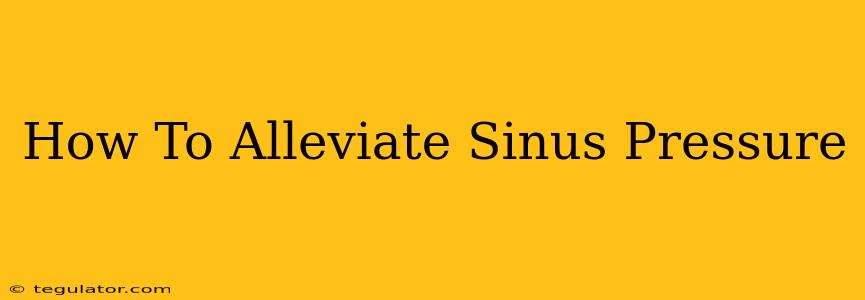Sinus pressure, that agonizing feeling of fullness and pain in your face, can make even the simplest tasks feel like a monumental effort. It's often a symptom of a sinus infection, allergies, or even a common cold. Fortunately, there are several ways to alleviate this discomfort. This guide will explore both home remedies and medical treatments to help you find relief.
Understanding Sinus Pressure
Before diving into solutions, it's important to understand what causes sinus pressure. Your sinuses are air-filled spaces within your skull, and when they become inflamed or blocked due to infection, allergies, or other irritants, pressure builds up. This pressure can cause pain in your forehead, cheeks, and around your eyes. Understanding the root cause can help you choose the most effective treatment.
Home Remedies for Sinus Pressure Relief
Many effective remedies can be implemented at home to ease sinus pressure. These are generally safe and can provide significant relief, particularly in the early stages of a sinus issue.
1. Saline Nasal Rinse (Nasal Irrigation)
A saline nasal rinse is often recommended as a first-line approach. This involves gently flushing your nasal passages with a saltwater solution. It helps to clear out mucus and irritants, reducing congestion and pressure. Make sure to use distilled or sterile water to avoid introducing harmful bacteria.
2. Steam Inhalation
Inhaling steam helps to loosen mucus, making it easier to drain and reducing pressure. Simply fill a bowl with hot water, drape a towel over your head, and lean over the bowl, inhaling the steam for several minutes. Adding a few drops of eucalyptus or peppermint essential oil can enhance the effects, but always use caution and dilute essential oils properly.
3. Hydration
Staying well-hydrated is crucial for thinning mucus and improving its drainage. Drink plenty of water, herbal tea, or clear broths throughout the day. Avoid dehydrating beverages like alcohol and caffeine.
4. Warm Compress
Applying a warm, damp compress to your forehead and cheeks can help soothe pain and inflammation. The heat helps to relax the muscles and improve blood flow to the area, reducing discomfort.
5. Elevate Your Head
Elevating your head while sleeping can help improve drainage and reduce pressure. Use extra pillows to keep your head slightly elevated.
6. Over-the-Counter Medications
Several over-the-counter medications can provide relief from sinus pressure. These include:
- Decongestants: These help to shrink swollen nasal passages, improving airflow and reducing pressure. However, it is important to use decongestants sparingly, as prolonged use can lead to rebound congestion.
- Pain relievers: Over-the-counter pain relievers like ibuprofen or acetaminophen can help to reduce pain and inflammation.
When to Seek Medical Attention
While home remedies can often provide relief, it's crucial to seek medical attention if your sinus pressure persists for more than a week or worsens. You should also consult a doctor if you experience:
- High fever
- Severe pain
- Pus or green/yellow mucus
- Difficulty breathing
Your doctor can diagnose the underlying cause of your sinus pressure and recommend appropriate treatment, which may include antibiotics, corticosteroids, or other medications.
Preventing Sinus Pressure
Preventing sinus pressure involves adopting healthy habits to maintain optimal sinus health:
- Avoid allergens: Identify and avoid known allergens.
- Wash your hands frequently: This helps prevent infection.
- Quit smoking: Smoking irritates the nasal passages and worsens sinus problems.
- Manage stress: Stress can weaken the immune system.
By following these tips and seeking medical help when needed, you can effectively manage sinus pressure and enjoy better respiratory health. Remember, consulting a healthcare professional is vital for accurate diagnosis and personalized treatment plans.

